329 start with P start with P
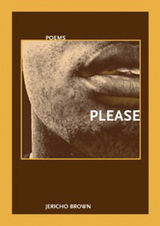
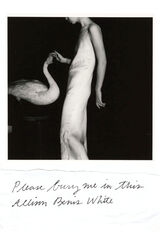

PLEASURE is a book-length poem which muses on the phenomenology of solitude in a pastoral landscape, written in a diaristic, lyric mode, where the queer “I” alternately savors the decadence of isolation and stands at the precipice of despair. A travelogue in verse, PLEASURE takes place in Syros, the Greek island to which author Angelo Nikolopolous travels a few weeks after the discovery of his mother’s brain tumor. These intertextual, elliptical explorations of solitude and sensuality interweave images of seaside roaming, secluded town life, and ephemeral sexual encounters with the ubiquitous implication of death—the waning summer, the ill, perhaps dying, mother. Staring down true disconnection—both physical and psychic orphanhood —Nikolopoulos writes about the thrill and sadness of turning your back against the world and those in it only to rediscover that which tethers all to human experience: the quotidian, singular pleasures of having a body.
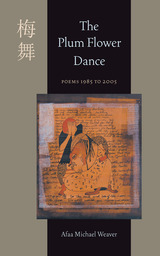
Winner of the 2008 Paterson Award for Literary Excellence
"Weaver has crafted a virtual planet in this book with plenty of alternate geographies for readers of all flavors and stripes. Marvelous. Huge. Prodigious.”
—North American Review
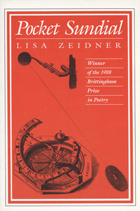
In this, the fourth volume to win the Brittingham Prize in Poetry, Lisa Zeidner’s twenty-two poems introduce a surprising range of characters, from a cryogenically preserved caveman to a 78-year-old widow arrested for shoplifting. Some of the narratives collected here are unusually long (like “Dementia Colander,” a mock-epic about the history of an unnamed nation whose king suffers a rare disease). These poems attempt to offer not just poetic moments, glimpses of joy or loss, but a sense of self in time and history—whole lives in all of their busy-ness and disorder. Lisa Zeidner’s dark wit considers any subject, from the Holocaust to child abuse, a subject for intellectual playfulness and emotional discovery.
Despite the range of subjects, the poems in Pocket Sundial are bound by a concern for time, for how we think about time. These are poems about memory, foresight, anticipation, regret—all of chronology’s complexities.

An enlightening examination of the relationship between poetry and the information technologies increasingly used to read and write it
Many poets and their readers believe poetry helps us escape straightforward, logical ways of thinking. But what happens when poems confront the extraordinarily rational information technologies that are everywhere in the academy, not to mention everyday life?
Examining a broad array of electronics—including the radio, telephone, tape recorder, Cold War–era computers, and modern-day web browsers—Seth Perlow considers how these technologies transform poems that we don’t normally consider “digital.” From fetishistic attachments to digital images of Emily Dickinson’s manuscripts to Jackson Mac Low’s appropriation of a huge book of random numbers originally used to design thermonuclear weapons, these investigations take Perlow through a revealingly eclectic array of work, offering both exciting new voices and reevaluations of poets we thought we knew.
With close readings of Gertrude Stein, Frank O’Hara, Amiri Baraka, and many others, The Poem Electric constructs a distinctive lineage of experimental writers, from the 1860s to today. Ultimately, Perlow mounts an important investigation into how electronic media allows us to distinguish poetic thought from rationalism. Posing a necessary challenge to the privilege of information in the digital humanities, The Poem Electric develops new ways of reading poetry, alongside and against the electronic equipment that is now ubiquitous in our world.
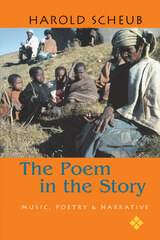
Fact and fiction meet at the boundaries, the betwixt and between where transformations occur. This is the area of ambiguity where fiction and fact become endowed with meaning, and this is the area—where ambiguity, irony, and metaphor join forces—that Harold Scheub exposes in all its nuanced and evocative complexity in The Poem in the Story.
In a career devoted to exploring the art of the African storyteller, Scheub has conducted some of the most interesting and provocative investigations into nonverbal aspects of storytelling, the complex relationship between artist and audience, and, most dramatically, the role played by poetry in storytelling. This book is his most daring effort yet, an unconventional work that searches out what makes a story artistically engaging and emotionally evocative, the metaphorical center that Scheub calls "the poem in the story." Drawing on extensive fieldwork in southern Africa and decades of experience as a researcher and teacher, Scheub develops an original approach—a blend of field notes, diary entries, photographs, and texts of stories and poems—that guides readers into a new way of viewing, even experiencing, meaning in a story. Though this work is largely focused on African storytelling, its universal applications emerge when Scheub brings the work of storytellers as different as Shakespeare and Faulkner into the discussion.
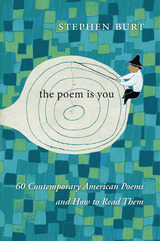
Contemporary American poetry has plenty to offer new readers, and plenty more for those who already follow it. Yet its difficulty—and sheer variety—leaves many readers puzzled or overwhelmed. The critic, scholar, and poet Stephanie Burt sets out to help. Beginning in the early 1980s, where critical consensus ends, Burt canvasses American poetry of the past four decades, from the headline-making urgency of Claudia Rankine’s Citizen to the stark pathos of Louise Glück, the limitless energy of Juan Felipe Herrera, and the erotic provocations of D. A. Powell.
The Poem Is You: Sixty Contemporary American Poems and How to Read Them is a guide to the diverse magnificences of American poetry today. It presents a wide range of poems selected by Burt for this volume, each accompanied by an original essay explaining how a given poem works, why it matters, and how the poem speaks to other parts of art and culture. Included here are some classroom classics (by Ashbery, Komunyakaa, Hass), less famous poems by very famous poets (Glück, Kay Ryan), and poems by prizewinning poets near the start of their careers (such as Brandon Som), and by others who are not—or not yet—well known.
The Poem Is You will appeal to poets, teachers, and students, but it is intended especially for readers who want to learn more about contemporary American poetry but who have not known where or how to start. It describes what American poets have fashioned for one another, and what they can give us today.
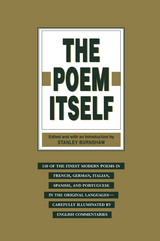
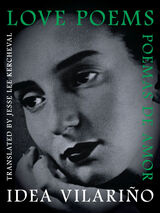
Eight years before Sylvia Plath published Ariel, the Uruguayan poet Idea Vilariño released Poemas del Amor, a collection of confessional, passionate poetry dedicated to the novelist Juan Carlos Onetti. Both of her own merit and as part of the Uruguayan writers group the Generation of ’45—which included Onetti, Mario Benedetti, Amanda Berenguer, and Ida Vitale—Vilariño is an essential South American poet, and part of a long tradition of Uruguayan women poets.
Vilariño and Onetti’s love affair is one of the most famous in South American literature. Poemas del Amor is an intense book, full of poems about sexuality and what it means to be a woman, and stands as a testament to both the necessity and the impossibility of love. This translation brings these highly personal poems to English speaking audiences for the first time side-by-side with the original Spanish language versions.
THE WITNESS
I don’t ask you for anything
don’t accept anything from you.
It’s enough that you are
in the world
that you know I am
in the world
that you might be
To me, you might be
witness judge and god.
If not
what is it for.
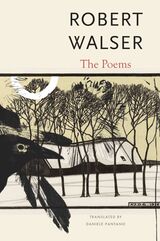
Admired by the likes of Kafka, Musil, and Walter Benjamin and acclaimed “unforgettable, heart-rending” by J. M. Coetzee, Swiss writer Robert Walser (1878–1956) remains one of the most influential authors of modern literature. Walser left school at fourteen and led a wandering and precarious existence while producing poems, stories, essays, and novels. In 1933, he abandoned writing and entered a sanatorium, where he remained for the rest of his life. “I am not here to write,” Walser said, “but to be mad.”
This first collection of Walser’s poems in English translation allows English-speaking readers to experience the author as he saw himself at the beginning and the end of his literary career––as a poet. The book also includes notes on dates of composition, draft versions of the printed poems, and brief biographical information on characters and locations that appear in the poems and may not be known to readers. Few writers have ever experienced such a steady rise in their reputation and public profile as Walser has seen in recent years, and this collection of his poems will help readers discover a unique writer whose off-kilter sensibility and innovations in form are perfectly suited to our fragmented, distracted, bewildering era.

The eleven books of poetry by Venantius Fortunatus include well-loved hymns, figure poems, epigrams on miracles, and elegies in the voices of abandoned or exiled women. The sixth-century poet began his career in northern Italy before moving to Gaul, where he wrote for the remainder of his life—praising kings and elites of the Merovingian dynasty and describing the natural scenery and society of his adopted homeland during the transition from late antiquity to the early Middle Ages. In his lively and inventive style, Fortunatus also addressed verses to religious figures such as his patron Gregory of Tours and to holy women such as Radegund, founder of the Convent of the Holy Cross in Poitiers, and Agnes, the convent’s first abbess.
Fortunatus’s imaginative metaphors and wry, self-mocking humor ensure his place in the canon of Christian Latin poets. This volume presents for the first time in English translation all of his poetry, apart from a single long saint’s life in verse.
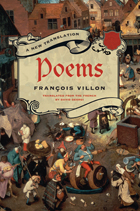
One of the most original and influential European poets of the Middle Ages, François Villon took his inspiration from the streets, taverns, and jails of Paris. Villon was a subversive voice speaking from the margins of society. He wrote about love and sex, money trouble, "the thieving rich," and the consolations of good food and wine. His work is striking in its directness, wit, and gritty urban realism. Villon’s writing spurred the development of the psychologically complex first-person voice in lyric poetry. He has influenced generations of avant-garde poets and artists. Arthur Rimbaud and Paul Verlaine have emulated Villon’s poetry. Claude Debussy set it to music, and Bertolt Brecht adapted it for the stage. Ezra Pound championed Villon’s poetry and became largely responsible for its impact on modern verse. With David Georgi’s ingenious translation, English-speaking audiences finally have a text that captures the riotous energy and wordplay of the original. With a newly revised French text that reflects the latest scholarship, this bilingual edition also features inviting and informative notes that illuminate the nuances of Villon’s poems and the world of medieval Paris.
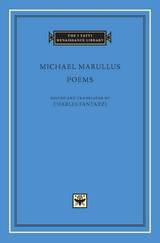
Michael Marullus (c. 1453/4–1500), born in Greece, began life as a mercenary soldier but became a prominent Neo-Latin poet and scholar who worked in Florence and Naples. He married the beautiful and learned Alessandra Scala, daughter of the humanist Bartolomeo Scala, chancellor of Florence, and his Epigrams bring alive the circle of Lorenzo di Pierfrancesco de’Medici. Among Marullus’ influences were ancient Greek texts such as the Homeric and Orphic hymns, the Corpus Hermeticum, the hymns of Proclus, Cleanthes, and Callimachus, and Julian the Apostate’s Hymn to the Sun. Marullus was particularly important, however, as one of the first Renaissance poets to imitate the works of Lucretius, and one witness reported that, after his death by drowning, a copy of the Roman poet’s works was found in his saddlebag. Later poets imitated him in vernacular love poetry, especially Ronsard; he even appears as a shadowy figure in the pages of George Eliot’s Romola, where he is depicted as a confirmed pagan.
This edition contains Marullus’ complete Latin poetry. All of these works appear in English translation for the first time.

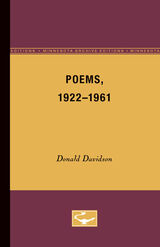
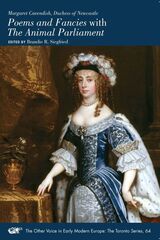
The Other Voice in Early Modern Europe. The Toronto Series: Volume 64
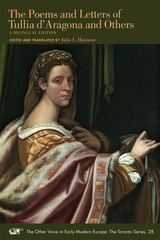
Hairston has constructed a full personal, cultural and literary biography for d’Aragona, using newly discovered letters, archival material of other kinds, and contemporary theory about gender in women’s writing. Footnotes establish the intricacy of Tullia’s intellectual networks and her courting of intellectuals in rhyme. Hairston includes poems written to d’Aragona, including Girolamo Muzio’s long pastoral, Tirrhenia. She addresses with tact the question of how sexual Tullia’s relationships were with her various interlocutors. At times, as she says, one just can’t know, but that the issue is much less important than the poems themselves. I agree wholeheartedly. This is the editor Tullia has been waiting for: an indefatigable researcher, a creative biographer, and a precise and appreciative literary critic.
—Ann Rosalind Jones
Esther Cloudman Dunn Professor of Comparative Literature, Smith College
The figure of Tullia d’Aragona has long fascinated readers as the prototype of the “honest courtesan”, a woman who successfully exploited her physical and intellectual charms to win the adoration and respect of the Italian cultural elite. With Julia Hairston’s richly annotated edition of her collected verse, the product of more than a decade of scholarship, d’Aragona finally comes into focus also as poet. She emerges in this volume as one of the most distinctive protagonists in a key transitional moment in Italian literary history, when the aristocratic tradition of Petrarchist lyric began to be reshaped and democratized by its encounter with print.
—Virginia Cox
Professor of Italian, New York University
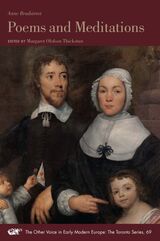
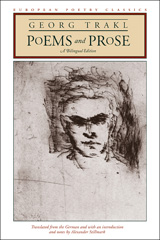
An undeniable aura surrounds the name of Georg Trakl, a poet of intense inner vision and originality whose work stands alongside that of Yeats, Valéry, and T. S. Eliot. Besides Rilke, his more famous admirers include Karl Kraus and Martin Heidegger. The distinctive tone of Trakl's work-especially admired by his patron Ludwig Wittgenstein-is autumnal and melancholy. Trakl was writing at a time of spiritual and social disintegration on the eve of the First World War, when personal values and perceptions tended to be subsumed in a more generalized anguish and exaltation. Neo-romantic, early modernist, his rich, vitally sensuous poetry can be seen to mark the transition from impressionism to expressionism, but at the same time transcends such categories. Trakl's poetry has previously only been available in English in short selections or in anthologies. This bilingual edition, the most comprehensive to date, gives readers the chance to get to know Trakl's work more fully than ever before.
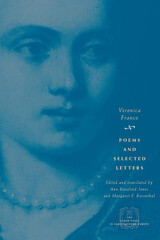
As an "honored courtesan", Franco made her living by arranging to have sexual relations, for a high fee, with the elite of Venice and the many travelers—merchants, ambassadors, even kings—who passed through the city. Courtesans needed to be beautiful, sophisticated in their dress and manners, and elegant, cultivated conversationalists. Exempt from many of the social and educational restrictions placed on women of the Venetian patrician class, Franco used her position to recast "virtue" as "intellectual integrity," offering wit and refinement in return for patronage and a place in public life.
Franco became a writer by allying herself with distinguished men at the center of her city's culture, particularly in the informal meetings of a literary salon at the home of Domenico Venier, the oldest member of a noble family and a former Venetian senator. Through Venier's protection and her own determination, Franco published work in which she defended her fellow courtesans, speaking out against their mistreatment by men and criticizing the subordination of women in general. Venier also provided literary counsel when she responded to insulting attacks written by the male Venetian poet Maffio Venier.
Franco's insight into the power conflicts between men and women and her awareness of the threat she posed to her male contemporaries make her life and work pertinent today.
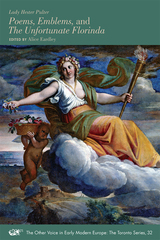
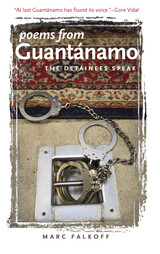
Since 2002, at least 775 men have been held in the U.S. detention center at Guantánamo Bay, Cuba. According to Department of Defense data, fewer than half of them are accused of committing any hostile act against the United States or its allies. In hundreds of cases, even the circumstances of their initial detainment are questionable.
This collection gives voice to the men held at Guantánamo. Available only because of the tireless efforts of pro bono attorneys who submitted each line to Pentagon scrutiny, Poems from Guantánamo brings together twenty-two poems by seventeen detainees, most still at Guantánamo, in legal limbo.
If, in the words of Audre Lorde, poetry “forms the quality of light within which we predicate our hopes and dreams toward survival and change,” these verses—some originally written in toothpaste, others scratched onto foam drinking cups with pebbles and furtively handed to attorneys—are the most basic form of the art.
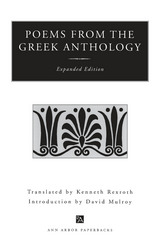
Friend to the Beats, organizer of the Six Gallery poetry reading in 1955, and iconoclastic poet extraordinare, Kenneth Rexroth here turns his imagination to a selection of verses from the Greek Anthology. In his lively style he successfully captures the spirit of the originals by such poets as Sappho, Anyte, Glykon, Antipatros, Leonidas, Askelpiades, and Ammianos. Students of the classics as well as poets and translators will welcome this collection for the insight and dexterity of its unconventional editor.
Kenneth Rexroth (1905-1982), poet, critic, and translator, is also noted for his translations from the Chinese and Japanese. Widely prolific, he helped usher in the Beat movement in the 1950s and is widely considered to have invented the idea of San Francisco as a center of literary innovation. David Mulroy is Associate Professor in the Department of Foreign Languages and Linguistics, University of Wisconsin, Milwaukee. He is the translator of Early Greek Lyric Poetry and Horace's Odes and Epodes.

An exquisite new translation of Guru Nanak's verses, illuminating the sacred tenets cherished by millions of Sikhs worldwide.
Guru Nanak (1469–1539), a native of Panjab, founded the Sikh religion. His vast corpus of nearly a thousand hymns forms the core of the Guru Granth Sahib, the Sikhs’ sacred book of ethics, philosophy, and theology. The scripture was expanded and enriched by his nine successors, and Sikhs continue to revere it today as the embodiment of their tradition.
Poems from the Guru Granth Sahib offers a compilation of spiritual lyrics showcasing the range and depth of Guru Nanak’s literary style while conveying his pluralistic vision of the singular divine and his central values of equality, inclusivity, and civic action. This new English translation includes celebrated long hymns such as “Alphabet on the Board” and “Ballad of Hope” alongside innovative shorter poems like “The Hours.” It is presented here alongside the original text in Gurmukhi, the script developed by the Guru himself.

The seventeenth-century Hindi classic treasured for its subtle and beautiful portrayal of divine and erotic love’s pleasures and sorrows.
In his Satsai, or Seven Hundred Poems, the seventeenth-century poet Biharilal draws on a rich vernacular tradition, blending amorous narratives about the god Krishna and the goddess Radha with archetypal hero and heroine motifs from older Sanskrit and Prakrit conventions. While little is known of Biharilal’s life beyond his role as court poet to King Jai Singh of Amber (1611–1667), his verses reflect deep knowledge of local north Indian culture and geography, especially the bucolic landscapes of Krishna’s youth in the Braj region (in today’s Uttar Pradesh). With ingenuity and virtuosity, Biharilal weaves together worldly experience and divine immanence, and adapts the tropes of stylized courtly poetry, such as romantic rivalries, clandestine trysts, and the bittersweet sorrow of separated lovers.
Poems from the Satsai comprises a selection of four hundred couplets from this enduring work. The Hindi text—composed in Braj Bhasha, the literary language of early-modern north India—is presented here in the Devanagari script and accompanies a new English verse translation.
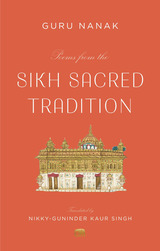
“A landmark volume, filled with beautiful renderings of writings from the Guru Granth Sahib.”
—Simran Jeet Singh, author of The Light We Give: How Sikh Wisdom Can Transform Your Life
An exquisite new translation of Guru Nanak’s verses, illuminating the sacred tenets cherished by millions of Sikhs worldwide.
Guru Nanak (1469–1539), a native of Panjab, founded the Sikh religion. His vast corpus of nearly a thousand hymns forms the core of the Guru Granth Sahib, the Sikhs’ sacred book of ethics, philosophy, and theology. The scripture was expanded and enriched by his nine successors, and Sikhs continue to revere it today as the embodiment of their tradition.
This beautiful new translation by Nikky-Guninder Kaur Singh, a foremost authority on Sikhism, offers a selection of spiritual lyrics composed by Guru Nanak. Here the reader will find the range and depth of his pluralistic vision of the singular divine and discover his central values of equality, inclusivity, and civic action—values that continue to shape the lives of Sikhs worldwide.
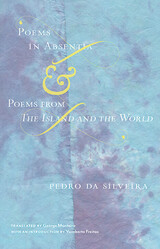

Belles lettres.
Sidonius Apollinaris, a Gallo-Roman, was born at Lugdunum (Lyon) about AD 430. He married Papianilla, daughter of the Emperor Avitus in whose honor he recited at Rome on 1 January 456 a panegyric in verse. Sidonius later joined a rebellion, it seems, but was finally reconciled to the emperor Majorian and delivered at Lyon in 458 a panegyric on him. After some years in his native land, in 467 he led a Gallo-Roman deputation to the Emperor Anthemius, and on 1 January 468 recited at Rome his third panegyric. He returned to Gaul in 469 and became Bishop of Auvergne with seat at Clermont-Ferrand. He upheld his people in resisting the Visigoths. After Auvergne was ceded to them in 475, he was imprisoned but soon resumed his bishopric. He was canonized after his death.
The Loeb Classical Library edition of Sidonius is in two volumes. The first contains his poetry: the three long panegyrics, and poems addressed to or concerned with friends, apparently written in his youth. Volume I also contains Books 1–2 of his Letters (all dating from before his episcopate); Books 3–9 are in Volume II. Sidonius’ writings shed valued light on Roman culture in the fifth century.
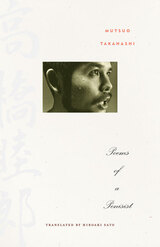
“In the name of / Man, member, / and the holy fluid, / Amen,” begins Mutsuo Takahashi’s epic one-thousand-line erotic fantasy poem, “Ode,” the centerpiece of his groundbreaking collection of queer poetry, Poems of a Penisist. Takahashi’s work, reminiscent of Walt Whitman’s, is a celebration of the male body, treating homosexual desire as something sacred. Stunningly beautiful and passionate, Poems of a Penisist is one of the most important compilations of homoerotic poetry written in the twentieth century.
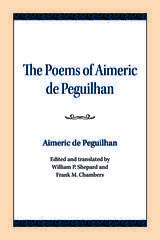


Interest in Emily Dickinson has grown throughout the years until, now, in this three-volume edition Thomas Johnson presents the entire body of poems she is known to have written, 1775 in all. Here are the familiar “I never saw a Moor” and “Because I could not stop for Death,” along with other less well-known poems, including forty-three never before published. Casual notes to friends and relatives which frequently accompany scraps of verse help to reveal the poet's enigmatic character. After keen analysis of the manuscripts, Johnson has arranged the poems in what is believed to be their chronological order, with variations and rejected versions of each poem following.
In his introduction, the editor discusses the stylistic and historical development of the poetic art of Emily Dickinson, and he considers the manuscripts and the history of the editing of the poems. A careful study of the poet's handwriting is illustrated with several facsimiles. The appendix contains valuable material on the recipients of the poems as well as a subject index and an index of first lines.


Emily Dickinson, poet of the interior life, imagined words/swords, hurling barbed syllables/piercing. Nothing about her adult appearance or habitation revealed such a militant soul. Only poems, written quietly in a room of her own, often hand-stitched in small volumes, then hidden in a drawer, revealed her true self. She did not live in time but in universals—an acute, sensitive nature reaching out boldly from self-referral to a wider, imagined world.
Dickinson died without fame; only a few poems were published in her lifetime. Her legacy was later rescued from her desk—an astonishing body of work, much of which has since appeared in piecemeal editions, sometimes with words altered by editors or publishers according to the fashion of the day.
Now Ralph Franklin, the foremost scholar of Dickinson's manuscripts, has prepared an authoritative one-volume edition of all extant poems by Emily Dickinson—1,789 poems in all, the largest number ever assembled. This reading edition derives from his three-volume work, The Poems of Emily Dickinson: Variorum Edition (1998), which contains approximately 2,500 sources for the poems. In this one-volume edition, Franklin offers a single reading of each poem—usually the latest version of the entire poem—rendered with Dickinson's spelling, punctuation, and capitalization intact. The Poems of Emily Dickinson: Reading Edition is a milestone in American literary scholarship and an indispensable addition to the personal library of poetry lovers everywhere.

Emily Dickinson, poet of the interior life, imagined words/swords, hurling barbed syllables/piercing. Nothing about her adult appearance or habitation revealed such a militant soul. Only poems, written quietly in a room of her own, often hand-stitched in small volumes, then hidden in a desk drawer, revealed her true self. She did not live in time, as did that other great poet of the day, Walt Whitman, but in universals. As she knowingly put it: “There is one thing to be grateful for—that one is one’s self and not somebody else.”
Dickinson lived and died without fame: she saw only a few poems published. Her great legacy was later rescued from her desk drawer—an astonishing body of work revealing her acute, sensitive nature reaching out boldly from self-referral to a wider, imagined world. Her family sought publication of Dickinson’s poetry over the years, selecting verses, often altering her words or her punctuation, until, in 1955, the first important attempt was made to collect and publish Dickinson’s work, edited by Thomas H. Johnson for the Belknap Press of Harvard University Press.
Now, after many years of preparation by Ralph W. Franklin, the foremost scholar of Dickinson’s manuscripts, a new comprehensive edition is available. This three-volume work contains 1,789 poems, the largest number ever assembled. The poems, arranged chronologically, based on new dating, are drawn from a range of archives, most frequently from holographs, but also from various secondary sources representing lost manuscripts. The text of each manuscript is rendered individually, including, within the capacity of standard type, Dickinson’s spelling, capitalization, and punctuation. Franklin gives Dickinson’s alternative readings for the poems, her revisions, and the line and page, or column, divisions in the source. Each entry identifies Franklin’s editorial emendations and records the publication history, including variants. Fourteen appendices of tables and lists give additional information, including poems attributed to Emily Dickinson. The poems are indexed by numbers from the Johnson edition, as well as by first lines.
Franklin has provided an introduction that serves as a guide to this edition and surveys the history of the editing of Dickinson’s poems. His account of how Dickinson conducted her workshop is a reconstruction of a remarkable poetic life.
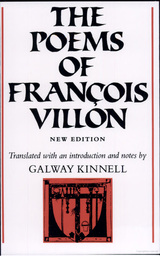
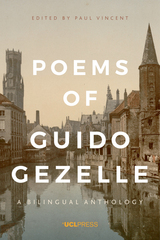
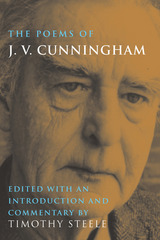
The lifework in verse of one of the century’s finest and liveliest American poets, this collection of the poems of J. V. Cunningham (1911-85) documents the poet’s development from his early days as an experimental modernist during the Depression to his emergence as the master of the classical “plain style”—distinguished by its wit, feeling, and subtlety.
Often identified with the epigram—a genre in which he excelled as distinctively as Jonson, Herrick, and Landor—Cunningham also wrote in a wide range of other poetic forms and was a remarkable translator. This collection, designed to show the poet’s range and skill, incorporates the materials of his 1971 Collected Poems and Epigrams and restores their original arrangement. It also adds many of his later poems and translations and some uncollected pieces from his periodicals.
Timothy Steele’s notes and introduction assist in re-establishing Cunningham’s position as a twentieth-century original, a poet who is remembered equally for emotional power and stylistic purity.

A literary discovery of considerable magnitude, these 98 previously unpublished poems by John Dewey, written principally in the 1910–18 period, illuminate an emotive aspect in his intellectual life often not manifest in the prose works.
Rumors of the existence of the poems have circulated among students of Dewey’s life and writings since 1957,when Mrs. Roberta Dewey gained possession of them from the Columbia University Columbiana collection. But except for the few persons who saw copies made by the French scholar Deladelle five years after Dewey’s death, the poems have remained inaccessible until now.
None of the poems has hitherto been published. Mrs. Roberta Dewey and Dewey’s children from his first marriage seem not to have known of Dewey’s experiments in verse during his lifetime. And, as evidence presented here now shows, only two or three acquaintances knew of actual poems written by Dewey, one of them the Polish-American novelist Anzia Yezierska, who had a brief emotional involvement with Dewey in the 1917–18 period. The factual, rather than inferential, evidence of Dewey’s relationship with Anzia Yezierska appears in the poems, which, taken as a whole, provide revealing insights into Dewey’s feelings and illuminate not only aspects of his emotions but of his thought as well.
The fact that Dewey did not publish the poetry himself, together with the circumstances of its discovery and unusual history, has led to the exceptionally careful editorial treatment of the poems given here. Scholars will find all the evidence for the authorship of the manuscripts clearly presented and all the changes and alterations carefully recorded. This edition has received the Modern Language Association of America Center for Editions of American Authors Seal as an “approved text.”

Here at last is the definitive Keats—an edition of John Keats’s poems that embodies the readings the poet himself most probably intended. The culmination of a tradition of literary and textual scholarship, it is the work of the one scholar best qualified to do the job.
Largely because of the wealth and complexity of the manuscript materials and the frequency with which first printings were based on inferior sources, there has never been a thoroughly reliable edition of Keats. Indeed, in The Texts of Keats’s Poems Jack Stillinger demonstrated that fully one third of the poems as printed in current standard editions contain substantive errors. This edition is the first in the history of Keats scholarship to be based on a systematic investigation of the transmission of the texts. The readings given here represent in each case, as exactly as can be determined, the version that Keats preferred. The chronological arrangement of the poems and the full record of variants and manuscript alterations (presented in a style that will be clear to the general reader as well as useful to the scholar) display the development of Keats’s poetic artistry. Notes at the back provide dates of composition, relate extant manuscripts and early printings, and explain the choices of texts.
The London Times said of Stillinger’s earlier study of the texts: “Thanks to Mr. Stillinger a revolution in Keats studies is at hand.” Here is the crucial step in that revolution.
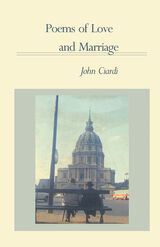
Collected from his published and heretofore unpublished work, the love poems of John Ciardi in Poems of Love and Marriage are a rich display of gentle wit, emotion, and craft. Not merely lyrics of youthful romance, these span the course of a love affair, of a life shared from first blush to old age.
These poems never disturb the sanctity of the private moment, but transcend the specific situation and bloom into universal recognition. And in his usual way of basking in those qualities which transform the ordinary into the unique, John Ciardi finds poignancy and truth in those elements of love and living together that so often go unnoticed.
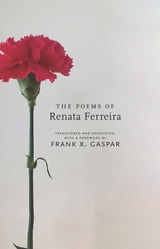
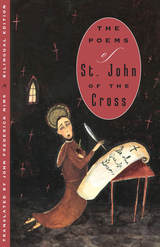
This dual-language edition makes available the original Spanish from the Codex of Sanlúcon de Barrameda with facing English translations. The work concludes with two essays—a critique of the poetry and a short piece on the Spanish text that appears alongside the translation—as well as brief notes on the individual poems.
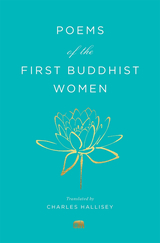
A stunning modern translation of a Buddhist classic that is also one of the oldest literary texts in the world written by women.
The Therīgāthā is one of the oldest surviving literatures by women, composed more than two millennia ago and originally collected as part of the Pali canon of Buddhist scripture. These poems were written by some of the first Buddhist women—therīs—honored for their religious achievements. Through imaginative verses about truth and freedom, the women recount their lives before ordination and their joy at attaining liberation from samsara. Poems of the First Buddhist Women offers startling insights into the experiences of women in ancient times that continue to resonate with modern readers. With a spare and elegant style, this powerful translation introduces us to a classic of world literature.
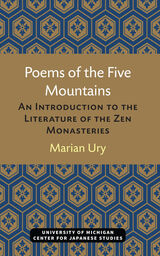
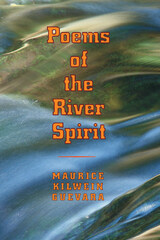
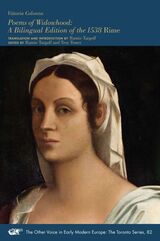
This volume presents the first complete English translation of the 1538 Rime and restores the original Italian texts from the blemished Parma printing and later composite editions, a boon to readers of both languages.

The poems in this collection range over a period of 60 years. The style is spare, direct, cutting to the core of subject. Richness of intelligence and a concern for the human has also characterized every phase of Lewis’ development.

C. P. Cavafy (Konstantinos Petrou Kavafis) is one of the most important Greek poets since antiquity. He was born, lived, and died in Alexandria (1863–1933), with brief periods spent in England, Constantinople, and Athens. Cavafy set in motion the most powerful modernism in early twentieth-century European poetry, exhibiting simple truths about eroticism, history, and philosophy—an inscrutable triumvirate that informs the Greek language and culture in all their diachrony. The Cavafy Canon plays with the complexities of ironic Socratic thought, suffused with the honesty of unadorned iambic verse.
Based on a fifty-year continuous scholarly and literary interaction with Cavafy’s poetry and its Greek and western European intertexts, John Chioles has produced an authoritative and exceptionally nuanced translation of the complex linguistic registers of Cavafy’s Canon into English.
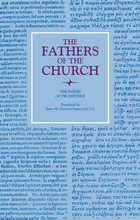
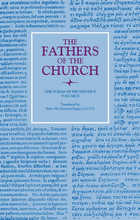
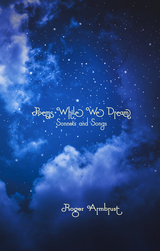


Taras Ševčenko (1814–1861) is the central figure in modern Ukrainian literature, but despite the enormous attention that has been devoted to his person, his work, and his role in Ukrainian history and the Ukrainian national renascence, the core of the Ševčenko phenomenon—the symbolic nature of his poetry—has received little systematic analysis.
As this book argues, myth serves as the underlying code and model of Ševčenko’s poetic universe. Examining the structures and paradigms of Ševčenko’s mythical thought provides answers for various crucial and heretofore intractable questions, such as those concerning the relation of his Ukrainian poetry to his Russian prose, his sense of a transcendent “curse” and “guilt” in the Ukrainian past and present, the interrelation of his revolutionist fervor with his apparent providentialism, or of the tension between the nativism and the universalism of his poetry.
Moreover, it is through the structures of his mythical thought that we can understand Ševčenko’s “prophecy,” in effect, his millenarian vision. In this framework, too, the author focuses on the religious tenor of Ševčenko’s poetry, in which he is both expiator and carrier of the Word, and, finally, on the reception—indeed the cult of Ševčenko among generations of Ukrainians.
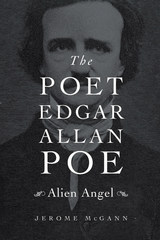
The poetry of Edgar Allan Poe has had a rough ride in America, as Emerson’s sneering quip about “The Jingle Man” testifies. That these poems have never lacked a popular audience has been a persistent annoyance in academic and literary circles; that they attracted the admiration of innovative poetic masters in Europe and especially France—notably Baudelaire, Mallarmé, and Valéry—has been further cause for embarrassment. Jerome McGann offers a bold reassessment of Poe’s achievement, arguing that he belongs with Whitman and Dickinson as a foundational American poet and cultural presence.
Not all American commentators have agreed with Emerson’s dim view of Poe’s verse. For McGann, a notable exception is William Carlos Williams, who said that the American poetic imagination made its first appearance in Poe’s work. The Poet Edgar Allan Poe explains what Williams and European admirers saw in Poe, how they understood his poetics, and why his poetry had such a decisive influence on Modern and Post-Modern art and writing. McGann contends that Poe was the first poet to demonstrate how the creative imagination could escape its inheritance of Romantic attitudes and conventions, and why an escape was desirable. The ethical and political significance of Poe’s work follows from what the poet takes as his great subject: the reader.
The Poet Edgar Allan Poe takes its own readers on a spirited tour through a wide range of Poe’s verse as well as the critical and theoretical writings in which he laid out his arresting ideas about poetry and poetics.
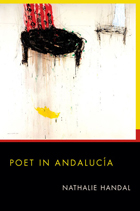
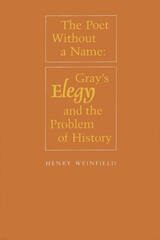
Henry Weinfield offers a new reading not only of the Elegy itself but also of its place in English literary history. His central argument is that in Gray’s Elegy the thematic constellation of poverty, anonymity, alienation, and unfulfilled potential—or what Weinfield calls the "problem of history"—is fully articulated for the first time, and that, as a result, the Elegy represents an important turning-point in the history of English poetry.
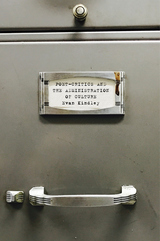
The period between 1920 and 1950 saw an epochal shift in the American cultural economy. The shocks of the 1929 market crash and the Second World War decimated much of the support for high modernist literature, and writers who had relied on wealthy benefactors were forced to find new protectors from the depredations of the free market. Private foundations, universities, and government organizations began to fund the arts, and in this environment writers were increasingly obliged to become critics, elucidating and justifying their work to an audience of elite administrators.
In Poet-Critics and the Administration of Culture, Evan Kindley recognizes the major role modernist poet-critics played in the transition from aristocratic patronage to technocratic cultural administration. Poet-critics developed extensive ties to a network of bureaucratic institutions and established dual artistic and intellectual identities to appeal to the kind of audiences and entities that might support their work. Kindley focuses on Anglo-American poet-critics including T. S. Eliot, Marianne Moore, W. H. Auden, Archibald MacLeish, Sterling A. Brown, and R. P. Blackmur. These artists grappled with the task of being “village explainers” (as Gertrude Stein described Ezra Pound) and legitimizing literature for public funding and consumption.
Modernism, Kindley shows, created a different form of labor for writers to perform and gave them an unprecedented say over the administration of contemporary culture. The consequences for our understanding of poetry and its place in our culture are still felt widely today.
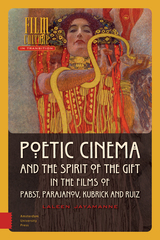
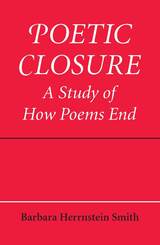
In Poetic Closure, distinguished literary scholar Barbara Herrnstein Smith explores the provocative question: How do poems end? To answer it, Smith examines numerous individual poems and examples of common poetic forms in order to reveal the relationship between closure and the overall structure and integrity of a poem. First published in 1968, Smith’s book remains essential reading in poetic theory.
“Ranging from Elizabethan lyric through free and syllabic verse and concrete poetry, Poetic Closure is a learned, witty, and richly illustrated study of the behavior of poems. . . . It can be read, enjoyed, studied by people who like reading poetry, including—I would suspect—poets.”—Richard M. Elman, New York Times Book Review

Poetic Creation was first published in 1980. Minnesota Archive Editions uses digital technology to make long-unavailable books once again accessible, and are published unaltered from the original University of Minnesota Press editions.
Myths of creativity have changed throughout Western literary history. The Romantic era cherished the idea of creativity as a spontaneous, unpremeditated act, closely related to improvisation. In the twentieth century the myth of the writer as a worker among workers has competed with the Surrealist myth of the spontaneous author who writes in a sort of trance. Yet there can be no doubt that the creative process as such crosses historical boundaries. Carl Fehrman devotes this book to the process of artistic creativity, focusing on the dichotomy between inspiration and effort and using texts and manuscripts from the period of early Romanticism to present.
Fehrman is primarily concerned with the creativity of poets and draws on authorial accounts of the process, the analysis of manuscripts in successive drafts, psychological and linguistic experiments in creativity, and accounts of creativity in other fields. At the heart of the book are case studies: on Coleridge's writings of "Kubla Khan," Poe's composition of "The Raven," And Valery's account of his prolonged work on "Le Cimetiere Marin." Fehrman also deals with literary works that have undergone genre transformation, Ibsen's Brand and Selma Lagerlof;s Gosta Berlings Saga. In closing chapters he draws upon his case studies and other materials to provide fascinating insights into both productivity and its converse, blocked creativity, and in this context discusses the general problem of periodicity in a creative life.
Fehrman works within a Swedish aesthetic tradition which has attracted philosophers, art historians, and literary scholars since the turn of the century, all of them intent on discovering the origins of the work of art. This translation brings his work to Englishspeaking literary scholars and will be of special interest to those concerned with comparative aesthetics and the creative process.

Engaging the poetic to expand our imagination of Maghrebi literature in French
Poetry, as the Moroccan writer Abdelkébir Khatibi describes it, is a form of dissymmetry that exposes readers to the unexpected, and to the possibility of a transformative encounter with the text. Drawing on literary, philosophical, theoretical, and theological texts in multiple languages and scripts, as well as on the visual arts, Thomas C. Connolly delves into the poetic works of Khatibi and six other major Maghrebi authors—Jean Amrouche, Tahar Djaout, Nabile Farès, Mohammed Khaïr-Eddine, Abdelwahab Meddeb, and Jean Sénac—as well as the French poet Arthur Rimbaud, to think anew about the origins and legacy of Francophone poetry in the Maghreb. Instead of turning away from the poetic when it becomes indecipherable, A Poetic Genealogy of North African Literature engages poetic texts on their own terms, allowing them to dictate the search for meaning, thereby expanding our understanding of what Maghrebi literature in French was, is, and might become.
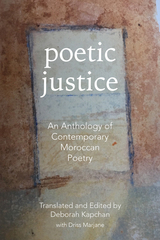
Poetic Justice is the first anthology of contemporary Moroccan poetry in English. The work is primarily composed of poets who began writing after Moroccan independence in 1956 and includes work written in Moroccan Arabic (darija), classical Arabic, French, and Tamazight.
Why Poetic Justice? Moroccan poetry (and especially zajal, oral poetry now written in Moroccan Arabic) is often published in newspapers and journals and is thus a vibrant form of social commentary; what’s more, there is a law, a justice, in the aesthetic act that speaks back to the law of the land. Poetic Justice because literature has the power to shape the cultural and moral imagination in profound and just ways.
Reading this oeuvre from independence until the new millennium and beyond, it is clear that what poet Driss Mesnaoui calls the “letters of time” have long been in the hands of Moroccan poets, as they write their ethics, their aesthetics, as well as their gendered and political lives into poetic being.
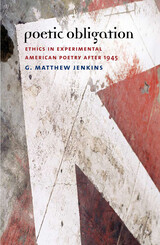
Since at least the time of Plato's Republic, the relationship between poetry and ethics has been troubled. Through the prism of what has been called the "new" ethical criticism, inspired by the work of Emmanuel Levinas, G. Matthew Jenkins considers the works of Objectivists, Black Mountain poets, and Language poets in light of their full potential to reshape this ancient relationship.
American experimental poetry is usually read in either political or moral terms. Poetic Obligation, by contrast, considers the poems of Louis Zukofsky, Charles Reznikoff, George Oppen, Edward Dorn, Robert Duncan, Susan Howe, and Lyn Hejinian in terms of the philosophical notion of ethical obligation to the Other in language. Jenkins's historical trajectory enables him to consider the full breadth of ethical topics that have driven theoretical debate since the end of World War II. This original approach establishes an ethical lineage in the works of twentieth-century experimental poets, creating a way to reconcile the breach between poetry and the issue of ethics in literature at large.
With implications for a host of social issues, including ethnicity and immigration, economic inequities, and human rights, Jenkins's imaginative reconciliation of poetry and ethics will provide stimulating reading for teachers and scholars of American literature as well as advocates and devotees of poetry in general. Poetic Obligation marshals ample evidence that poetry matters and continues to speak to the important issues of our day.
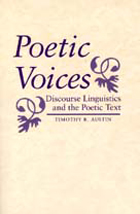
Poems written in the first person, poems that contain passages of conversation or dialogue, and narrative poems all rely on their readers’ capacity to process discourse. Discourse features in the texts of those poems—features such as temporal and spatial reference, narrative “framing”, and the strategic use of direct speech—inevitably affect the way readers receive the central themes. Recent developments in linguistic theory, including developments that address discourse structure, thus offer literary scholars new tools for approaching a richer understanding of those poems.

The Poetic Workmanship of Alexander Pope was first published in 1955. Minnesota Archive Editions uses digital technology to make long-unavailable books once again accessible, and are published unaltered from the original University of Minnesota Press editions.
Through a detailed examination of Alexander Pope's poetic practices, Mrs. Parkin throws light both on the craftsmanship and on the philosophical concepts which governed the creative thought of the poet. She analyzes Pope's use of such literary devices as irony, antithesis, metaphor, narrative, paradox, tension, tonal variation, and the dramatic speaker. She discusses the Pope's work as a whole. The study also provides an evaluation of the influence on Pope's work of the neo-classical concepts of genre and imitation.

Bernardus Silvestris exemplifies the scholastic culture of his time. Having studied with pioneers in philosophy and science, he became a renowned teacher of literary and poetic composition. His versatility as scholar, philosopher, and scientist is apparent in his masterpiece, the Cosmographia. In alternating verse and prose, this foundational text for later Latin and vernacular literature synthesizes important intellectual movements of the early twelfth century. It owes its deepest debt to the tradition of philosophical allegory, including Plato’s Timaeus, Cicero’s Somnium Scipionis, and the prosimetra of Martianus Capella and Boethius. Bernardus also displays a masterly awareness of classical Latin poetry. Though less widely influential than his great disciple, Alan of Lille, Bernardus is the most subtle of the twelfth-century Latin poets; the Cosmographia has been aptly compared to the poetry of Lucretius and Giordano Bruno, and a copy survives written in the hand of Boccaccio.
In Mathematicus (“The Astrologer”), a Roman hero, faced with an astrologer’s prediction that he will kill his father, resolves to defy fate by committing suicide. This text is the most substantial of the surviving twelfth-century poems based on the ancient exercises in rhetoric known as controversiae, and it illustrates the twelfth century’s concern with astral determinism.
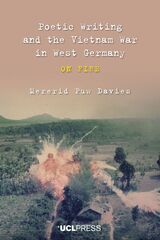
Though the Vietnam War did not directly involve West Germany, it was nonetheless a decisive catalyst for the era’s wider protest movements in that country, and it gave rise to an ardent anti-war discourse. Poetry and poetic writing were key to anti-war work. Hundreds of poems and related writings about Vietnam circulated in West Germany, yet they are almost entirely forgotten today. Poetic Writing and the Vietnam War in West Germany uncovers and explores some of that rich artistic production in order to present a new history of engaged poetic writing in West Germany in the 1960s and 1970s and to draw out distinctive characteristics of wider protest culture. In doing so, it makes the case for attending to marginal, non-canonical, or neglected literary and cultural forms, and for critical thinking about why they might, over time, have been obscured. The book also offers a case study for reflection on the representation of war, on ways in which German oppositional culture could imagine its others, and on the relationship of poetry to the historical world.
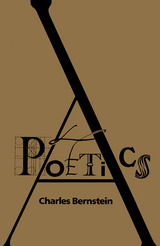
This rich collection is far more than an important work of criticism by an extraordinary poet; it is a poetic intervention into criticism. "Artifice of Absorption," a key essay, is written in verse, and its structures and rhythms initiate the reader into the strength and complexity of the argument. In a wild variety of topics, polemic, and styles, Bernstein surveys the current poetry scene and addresses many of the hot issues of poststructuralist literary theory. "Poetics is the continuation of poetry by other means," he writes. What role should poetics play in contemporary culture? Bernstein finds the answer in dissent, not merely in argument but in form--a poetic language that resists being easily absorbed into the conventions of our culture.
Insisting on the vital need for radical innovation, Bernstein traces the traditions of modern poetry back to Stein and Wilde, taking issue with those critics who see in the "postmodern" a loss of political and aesthetic relevance. Sometimes playful, often hortatory, always intense, he joins in the debate on cultural diversity and the definition of modernism. We encounter Swinburne and Morris as surprising precursors, along with considerations of Wittgenstein, Khlebnikov, Adorno, Jameson, and Pac-Man. A Poetics is both criticism and poetry, both tract and song, with no dull moments.
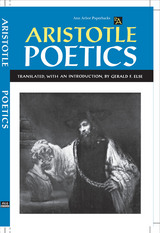
In his masterful translation and accompanying notes, Dr. Else makes a special effort to achieve maximum clarity, while remaining faithful to the original. His constant aim is to provide -- for all readers -- a "way in" to Aristotle's processes of thinking about literature.
This important modern translation is made form the 1965 Oxford Classical Text edition of the Poetics by Rudolf Kassel and thus reflects the latest and most authoritative textual scholarship. Not only the translation but the valuable fund of commentary will delight anyone -- literary critic, philosopher, classicist, or general reader -- who want to learn what Aristotle really said.
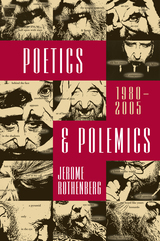
Poetics & Polemics, 1980-2005 brings together in one volume a wide-ranging selection of essays and commentaries by one of the most significant poets, critics, and translators working with American and international poetry today.
Jerome Rothenberg’s work spans a period of over forty years and nearly one hundred books, and though perhaps best known as a poet, his critical and theoretical contributions to the fields of innovative, experimental poetry have become equally important facets of his work. Rothenberg’s earliest critical writings concerned themselves with ethnopoetics and the poetics of performance. In the last twenty years his critical thinking has evolved to encompass more explicitly issues of modernism, postmodernism, and the avant-garde, as well as meditations on the nature of the book and writing. This volume extends and elaborates all of those interests, allowing for the first time a comprehensive glimpse of the full trajectory of his thinking.
In the first section, “Poetics and Polemics,” Rothenberg’s essays address a range of issues with which he’s become closely associated, among them the anthology as a critical and polemical tool; the intersection of poetry with art, performance, and politics, in both contemporary and traditional practice; the poetics of Jewish mysticism as a traditional form of conceptual and language poetry; and the universality of poetic discourse, particularly as seen in tribal poetry or in poetic traditions long separated from the Western literary mainstream. In “A Gallery of Poets” is Rothenberg’s lively explorations of the work of other poets, as they relate to his own work, to avant-garde poetry in general, and to the poetic traditions that concern him the most. Finally, in “Dialogues and Interviews” are Rothenberg’s unbridled meditations and musings on what he calls “the life of poetry” outside the bounds of book and binding, class and category, a dynamic force at the center of all that we call human.
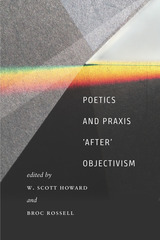
Poetics and Praxis ‘After’ Objectivismexamines late twentieth-and early twenty-first-century poetics and praxis within and against the dynamic, disparate legacy of Objectivism and the Objectivists. This is the first volume in the field to investigate the continuing relevance of the Objectivist ethos to poetic praxis in our time. The book argues for a reconfiguration of Objectivism, adding contingency to its historical values of sincerity and objectification, within the context of the movement’s development and disjunctions from 1931 to the present.
Essays and conversations from emerging and established poets and scholars engage a network of communities in the U.S., Canada, and the U.K., shaped by contemporaneous oppositions as well as genealogical (albeit discontinuous) historicisms. This book articulates Objectivism as an inclusively local, international, and interdisciplinary ethos, and reclaims Objectivist poetics and praxis as modalities for contemporary writers concerned with radical integrations of aesthetics, lyric subjectivities, contingent disruption, historical materialism, and social activism. The chapter authors and roundtable contributors reexamine foundational notions about Objectivism—who the Objectivists were and are, what Objectivism has been, now is, and what it might become—delivering critiques of aesthetics and politics; of race, class, and gender; and of the literary and cultural history of the movement’s development and disjunctions from 1931 to the present.
Contributors: Rae Armantrout, Julie Carr, Amy De’Ath, Jeff Derksen, Rachel Blau DuPlessis, Graham Foust, Alan Golding, Jeanne Heuving, Ruth Jennison, David Lau, Steve McCaffery, Mark McMorris, Chris Nealon, Jenny Penberthy, Robert Sheppard
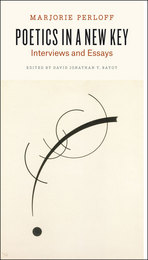
The fourteen interviews in Poetics in a New Key—conducted by scholars, poets, and critics from the United States, Denmark, Norway, France, and Poland, including Charles Bernstein, Hélène Aji, and Peter Nicholls—cover a broad spectrum of topics in the study of poetry: its nature as a literary genre, its current state, and its relationship to art, politics, language, theory, and technology. Also featured in the collection are three pieces by Perloff herself: an academic memoir, an exploration of poetry pedagogy, and an essay on twenty-first-century intellectuals. But across all the interviews and essays, Perloff’s distinctive personality and approach to reading and talking resound, making this new collection an inspiring resource for scholars both of poetry and writing.
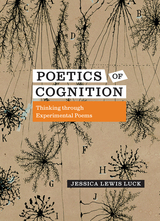
The cognitive research Luck draws upon suggests that the strangeness of experimental poetry can reshape the activity of the reader’s mind, creating new forms of attention, perception, and cognition. This book closes by shifting from theory to praxis, extracting forms of teaching from the forms of thinking that experimental poems instill in order to better enable their transformative effects in readers and to bring poetry pedagogy into the twenty-first century.
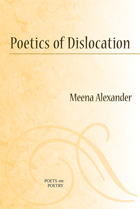
Poetics of Dislocation sets the work of contemporary American poetry within the streams of migration that have made the nation what it is in the twenty-first century. There are few poets better qualified to muse on that context than Meena Alexander, who spent her life studying at prestigious institutions around the globe before settling in the United States to work on her acclaimed body of poetry.
Part of the University of Michigan Press's award-winning Poets on Poetry series, Poetics of Dislocation studies not only the personal creative process Alexander uses, but also the work of other prominent writers. Alexander discusses what it means to come to America as an adult to write poetry, and her place---and that of others---in the collection of cultures that makes up this country. She outlines the dilemmas that face modern immigrant poets, including how to make a place for oneself in a new society and how to write poetry in a time of violence worldwide.
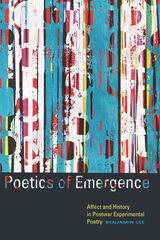
Experimental poetry responded to historical change in the decades after World War II, with an attitude of such casual and reckless originality that its insights have often been overlooked. However, as Benjamin Lee argues, to ignore the scenes of self and the historical occasions captured by experimental poets during the 1950s and 1960s is to overlook a rich and instructive resource for our own complicated transition into the twenty-first century.
Frank O’Hara and fellow experimental poets like Amiri Baraka, Diane di Prima, and Allen Ginsberg offer us a set of perceptive responses to Cold War culture, lyric meditations on consequential changes in U.S. social life and politics, including the decline of the Old Left, the rise of white-collar workers, and the emergence of vernacular practices like hipsterism and camp. At the same time, they offer us opportunities to anatomize our own desire for historical significance and belonging, a desire we may well see reflected and reconfigured in the work of these poets.
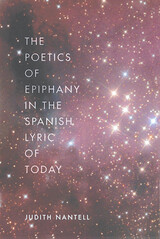
Published by Bucknell University Press. Distributed worldwide by Rutgers University Press.

T. S. Eliot and Ezra Pound dominated English poetry and criticism in the first half of the twentieth century. At the center of their practice is what Maud Ellmann calls the poetics of impersonality. Her examination yields a set of superb readings of the major poems of the modernist canon. Eliot and Pound mounted attack after attack on nineteenth-century poetry from Wordsworth to Swinburne, poetry they believed nurtured an unhealthy cult of the self. They wanted poetry to be a transparent medium that gives its readers access to reality and meaning. Poetry, they argued, should efface itself, because writing that calls attention to itself calls attention to the distinctive personality of the writer. Ellmann convincingly shows that their arguments are self-contradictory and that their efforts to eliminate personality merely reinstate it in a different guise.
After an initial section on Eliot’s relation to Bergson, Ellmann goes on to analyze Eliot’s “Tradition and the Individual Talent” and the later After Strange Gods, the early poems, The Waste Land, and Four Quartets; she then turns to Pound’s Personae, particularly “Mauberley,” and the Cantos. Ellmann looks for the contradictions inherent in modernist literary ideology and deftly teases out their implications. Her writing is stylish in the best sense and, in terms of its theoretical vocabulary and assumptions, impeccable. This book marks the debut of a major literary critic.

Set to generate discussions in the field for years to come, The Poetics of Poetry Film is an encyclopedic work on the ever-evolving art of the poetry film. Poetry films are a genre of short film usually involving three main elements: the poem as verbal message, the moving film image and diegetic sounds, and additional non-diegetic sounds or music, which create a soundscape. In this book, Sarah Tremlett examines the formal characteristics of the poetic in poetry film, film poetry, and videopoetry, particularly in relation to lyric voice and time.
Tremlett sets the emergence and history of poetry film in its proper global context, defining and debating terms both philosophically and materially. Showcasing the work of an international array of practitioners, The Poetics of Poetry Film includes interviews, analysis, and a rigorous investigation of the history of the genre, from its origins to the present. This is an industry bible for anyone interested in poetry, digital media, filmmaking, art, and creative writing, as well as poetry filmmakers.
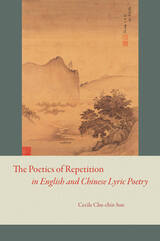
For more than half a century, Chinese-Western comparative literature has been recognized as a formal academic discipline, but critics and scholars in the field have done little to develop a viable, common basis for comparison between these disparate literatures. In this pioneering book, Cecile Chu-chin Sun establishes repetition as the ideal perspective from which to compare the poetry and poetics from these two traditions.
Sun contends that repetition is at the heart of all that defines the lyric as a unique art form and, by closely examining its use in Chinese and Western poetry, she demonstrates howone can identify important points of convergence and divergence. Through a representative sampling of poems from both traditions, she illustrates how the irreducible generic nature of the lyric transcends linguistic and cultural barriers but also reveals the fundamental distinctions between the traditions. Most crucially, she dissects the two radically different conceptualizations of reality—mimesis and xing—that serve as underlying principles for the poetic practices of each tradition.
Skillfully integrating theory and practice, The Poetics of Repetition in English and Chinese Lyric Poetryprovides a much-needed model for future study of Chinese and English poetry as well as lucid, succinct interpretations of individual poems.
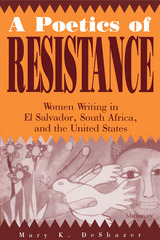
Engaging the works of critics such as Chandra Mohanty, Barbara Harlow, Claribel Alegria, Albie Sachs, and Audre Lorde, among others, Mary DeShazer reconceptualizes traditional notions of resistance and literature and the relationship between them. She argues that women’s voices have been underrepresented in previous analyses of Third World resistance poetry, and that when examined collectively, their work reveals overtly gendered concerns that distinguish it from that of their male counterparts.
DeShazer defines resistance as an active quest for justice and a means of collective empowerment. She looks at the diasporic consciousness of exiled and dislocated women, examines the tensions between claims of identity and claims of difference, and explores the ways in which gender and struggle connect women across nationalities and historical imperatives. Her analysis of Salvadoran and South African women’s poetry reveal the ways in which poetic conventions can be seen as “political declarations of privilege,” casting a new light on women’s resistance poetry in the United States.

The Poetics of Scale takes us back to the years before the First World War in Paris, where the poet Guillaume Apollinaire claimed to have invented a new mode of poetry large enough to take on the challenges of the coming twentieth century. This history follows Apollinaire’s ideas across the Atlantic and examines how and why his work became such a vital source of inspiration for American poets through the era of intensive American economic expansion and up to the present day. Threading together Apollinaire’s work in the 1910s with three of his American successors—Louis Zukofsky in the 1930s, Allen Ginsberg in the 1950s, and Alice Notley from the 1970s onward—it shows how poetry as a cultural technique became the crucial test case for the scale of our collective imagination.

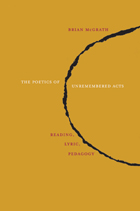

Though Bonnefoy's work is familiar to American scholars, the complexity of his thought and style has created a need for a critical introduction to his work. This first major study of Bonnefoy written in English provides an overview of his entire literary career. Naughton situates Bonnefoy in the context of the existential philosophical tradition that nurtured him and in the poetic and artistic tradition that includes Dante and Shakespeare, Piero and Poussin, Baudelaire and Rimbaud. Bonnefoy's poems appear in both French and English, and all quotations from his prose have been translated.
This book will appeal not only to the growing number of students and scholars of French literature interested in Bonnefoy's work, but also to those who study comparative poetry and the relation of poetry to art and to contemporary religious thought.
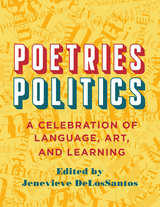
Reproduced in full color and with the accompanying poems in both their original language and a translation, this catalogue commemorates the incredible creative spirit of the project and provides a new way of contemplating these great poetic works.
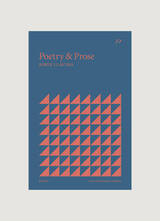
The Hermitage, a long poem of more than 1400 lines, tells of the author’s physical and metaphysical journey up a hill in southern Catalonia to visit a hermitage. Llavina touches on many themes in this poem, including love, death, family, loss, hope and memories. In 2019, Jordi Llavina was awarded the prestigious Lletra d’Or prize for this poem.
The second piece of work in the collection is The Pomegranate. Again written about a journey, The Pomegranate is a mix of both poetry and prose and tells the story of a grieving wanderer through the Catalan countryside.
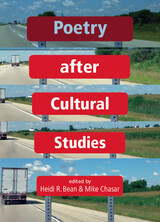
Poetry after Cultural Studies elucidates the potential of poetry scholarship when joined with cultural studies. In eight searching essays covering an astonishing range of poetic practices, geographical regions, and methodological approaches, this volume reflects on what poetry can accomplish in the broadest social and cultural contexts. From Depression-era Iowa to the postcolonial landscape of French-speaking Martinique, whether appearing in newspapers, correspondences, birders’ field guides, cross-stitches, or television and the internet, the poetry under consideration here is rarely a private, lyrical endeavor. For a great number of people writing, reading, publishing, and using poetry over the past 150 years, verse has not been a retreat from modern life, but a way of engaging with, and even changing, it.


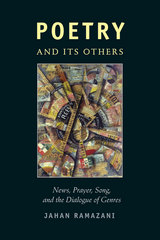


Throughout the history of imperial China, the educated elite used various means to criticize government policies and actions. During the Song dynasty (960-1278), some members of this elite found an elegant and subtle means of dissent: landscape painting.
By examining literary archetypes, the titles of paintings, contemporary inscriptions, and the historical context, Alfreda Murck shows that certain paintings expressed strong political opinions—some transparent, others deliberately concealed. She argues that the coding of messages in seemingly innocuous paintings was an important factor in the growing respect for painting among the educated elite and that the capacity of painting's systems of reference to allow scholars to express dissent with impunity contributed to the art's vitality and longevity.
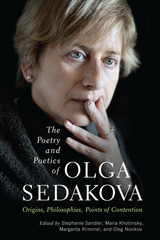
Essayists from Russia, Ukraine, Germany, Italy, and the United States show how Sedakova has contributed to ongoing aesthetic and cultural debates. Like Sedakova's own work, the volume affirms the capacity of words to convey meaning and to change our understanding of life itself. The volume also includes dozens of elegant new translations of Sedakova's poems.

Richard Poirier, one of America's most eminent critics, reveals in this book the creative but mostly hidden alliance between American pragmatism and American poetry. He brilliantly traces pragmatism as a philosophical and literary practice grounded in a linguistic skepticism that runs from Emerson and William James to the work of Robert Frost, Gertrude Stein, and Wallace Stevens, and on to the cultural debates of today.
More powerfully than ever before, Poirier shows that pragmatism had its start in Emerson, the great example to all his successors of how it is possible to redeem even as you set out to change the literature of the past. Poirier demonstrates that Emerson—and later William James—were essentially philosophers of language, and that it is language that embodies our cultural past, an inheritance to be struggled with, and transformed, before being handed on to future generations. He maintains that in Emersonian pragmatist writing, any loss—personal or cultural—gives way to a quest for what he calls “superfluousness,” a kind of rhetorical excess by which powerfully creative individuals try to elude deprivation and stasis. In a wide-ranging meditation on what James called “the vague,” Poirier extols the authentic voice of individualism, which, he argues, is tentative and casual rather than aggressive and dogmatic.
The concluding chapters describe the possibilities for criticism created by this radically different understanding of reading and writing, which are nothing less than a reinvention of literary tradition itself. Poirier's discovery of this tradition illuminates the work of many of the most important figures in American philosophy and poetry. His reanimation of pragmatism also calls for a redirection of contemporary criticism, so that readers inside as well as outside the academy can begin to respond to poetic language as the source of meaning, not to meaning as the source of language.

Based on rich ethnographic work in Western and non-Western cultures, the essays represent distinct approaches to the topic, from one person's account of her interactions with a possessing spirit to another's world-spanning statement on prophetic poetics. Each contributor challenges easy assumptions that poetic texts are crafted works, products of skill rather than inspiration, while prophetic speech and writing are best understood as spontaneous performance rather than formal art.
As a whole the collection aims to reorient the anthropological study of possession and oracular experiences toward an awareness of the word, and to draw the attention of literary critics to "inspired" poetry. It will also appeal to readers in performance studies and comparative religion.
Contributors are Marjorie Mandelstam Balzer, James Fernandez, Paul Friedrich, John Leavitt, Dennis Tedlock, Margaret Trawick.
John Harold Leavitt is Professor of Anthropology, University of Montreal.

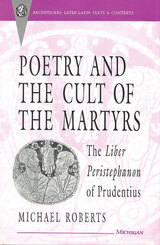

Herself an acclaimed poet, Stewart not only brings the intelligence of a critic to the question of poetry, but the insight of a practitioner as well. Her new study draws on reading from the ancient Greeks to the postmoderns to explain how poetry creates meanings between persons. Poetry and the Fate of the Senses includes close discussions of poems by Stevens, Hopkins, Keats, Hardy, Bishop, and Traherne, of the sense of vertigo in Baroque and Romantic works, and of the rich tradition of nocturnes in visual, musical, and verbal art. Ultimately, Stewart explores the pivotal role of poetry in contemporary culture. She argues that poetry can counter the denigration of the senses and can expand our imagination of the range of human expression.
Poetry and the Fate of the Senses won the 2004 Truman Capote Award for Literary Criticism in Memory of Newton Arvin, administered for the Truman Capote Estate by the University of Iowa Writers' Workshop. It also won the Phi Beta Kappa Society's 2002 Christian Gauss Award for Literary Criticism.
READERS
Browse our collection.
PUBLISHERS
See BiblioVault's publisher services.
STUDENT SERVICES
Files for college accessibility offices.
UChicago Accessibility Resources
home | accessibility | search | about | contact us
BiblioVault ® 2001 - 2024
The University of Chicago Press









